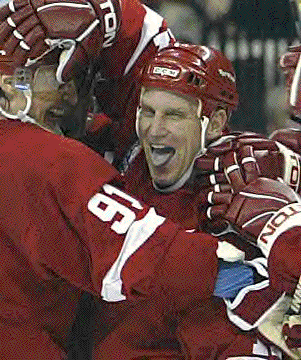My Detroit Red Wings fan site | home
Brett Hull #17







RIGHT WING
|
|
SHOOTS »
|
Right
|
||
HEIGHT »
|
5'11"
|
||
WEIGHT »
|
205 lbs.
|
||
BIRTHDATE »
|
August 9, 1964
|
||
BIRTHPLACE »
|
Belleville, Ontario
|
||
RESIDES »
|
Novi, Michigan
|
||
DRAFTED »
|
117th Overall, 6th Round, 1984 (CGY)
|
||
COMPENSATION »
|
$3,500,000.00 US
|
||
CONTRACT ENDS »
|
2003
|
||
ACQUIRED »
|
Signed as an Unrestricted Free Agent (no compensation) from the Dallas Stars, 08/22/01.
|
||
2000-2001 STATISTICS (with Dallas Stars/NHL)
|
REGULAR SEASON »
|
STANLEY CUP PLAYOFFS »
|
|||||||||||||||
GP
|
G
|
A
|
PTS
|
+/-
|
PIM
|
SH
|
SH%
|
GP
|
G
|
A
|
PTS
|
+/-
|
PIM
|
SH
|
SH%
|
|
79
|
39
|
40
|
79
|
10
|
18
|
219
|
17.81
|
10
|
2
|
5
|
7
|
-1
|
6
|
41
|
4.88
|
|
PERSONAL INFORMATION
|
Brett Hull was drafted 117th overall in the 1984 Entry Draft by the Calgary Flames. He made his NHL debut on May 20, 1986 in the third game of the Stanley Cup finals against the Canadiens. The following season, Brett made his regular season debut on November 13 against the Whalers and scored his first goal. After playing only five regular season games at the NHL level in 1986-87, Brett scored two goals in four playoff games. In 1987-88, Brett joined the Flames full-time and won Rookie of the Month honours in November. After scoring 26 goals in 52 games, Brett was traded with Steve Bozek on March 7 to the St. Louis Blues for Rob Ramage and Rick Wamsley. After scoring six goals in 13 games down the stretch, Brett scored a team-best seven times in ten playoff games.
In 1988-89, Brett led the Blues with 41 goals, 84 points, 16 power play goals (tied) and six game-winning goals (tied). He also played in his first mid-season All-Star Game. In ten playoff games, he scored five goals. In 1989-90, Brett was placed on a line with centre Adam Oates and he broke out for a league-best 72 goals (record for right wingers). He paced the league with 27 power play goals, 12 game-winning goals and 385 shots and paced his team with 113 points (fifth in NHL). He was a First Team All-Star, he won the Lady Byng Trophy and Dodge Ram Tough Award and was the second runner-up to both the Hart Trophy and Pearson Award. During the season, he posted a 20-game scoring streak (35 points from December 30 to February 11), played in his second All-Star Game and won Player of the Month honours (January). In 12 playoff games, Brett scored 13 goals and 21 points.
In 1990-91, Brett won his second straight goal-scoring title and broke his own record for goals in a season by a right winger (86). He was a First Team All-Star and won the Hart Trophy, the Pearson Award and the Pro Set Player of the Year Award. On January 25, Brett scored his 50th goal in just his 49th game of the season. In February, he won Player of the Month honours. By year's end, he had paced the league with 29 power play goals, 11 game-winning goals and 389 shots and also paced his team with 131 points (second in NHL) and a +23 rating. He also helped the Blues improve 22 points under coach-of-the-year Brian Sutter. In the playoffs, he scored 11 goals and 19 points in 13 games.
In 1991-92, Brett won his third straight goal-scoring title with 70 goals. On November 10, he won Player of the Week honours; on January 18, he won All-Star Game MVP honours with two goals and one assist. From November 28 to January 23, Brett scored points in 25 consecutive games (31 goals and 46 points). On January 28, Brett became the second player in league history to score 50 goals in 50 games in back-to-back seasons. Brett paced the league with 408 shots on net and paced his team with 109 points, 20 power play goals, five shorthanded goals and nine game-winning goals. At season's end, he was a First Team All-Star and a finalist (third place) for the Hart Trophy. In six playoff games playing alongside new centre Craig Janney, Brett scored four times.
In 1992-93, Brett scored 100-plus points (101) for the fourth straight season and paced his team in goal-scoring (54) for the fifth straight year. He played in his fourth All-Star Game and had more fan ballot votes that any other player for the third straight year. He then finished the season first on his team and second in the league with 29 power play goals and 390 shots on net. He also scored a career high 47 assists. In the playoffs, he scored eight goals in 11 games. At year's end, he was ranked 11th on The Hockey News' Top-25 players list. In 1993-94, Brett scored 50-plus goals (team-best 57) and 20-plus power play goals (league-best 25) for the fifth straight year. He also finished second in the league with 392 shots (five behind teammate Brendan Shanahan). On November 15, he won Player of the Week honours. On January 2 against the Flames, he scored his 353rd goal with the Blues to break the team record previously held by Bernie Federko. Three weeks later on January 22, he played in his fifth All-Star Game (one assist). In the playoffs, he scored two goals in four games
In the shortened 1994-95 season, Brett paced his team with 29 goals, 50 points, nine power play goals, three shorthanded goals, six game-winning goals (tied) and 200 shots (second in NHL). On April 16, he recorded his first four-goal game. In the playoffs, he scored six goals in seven games. In 1995-96, Brett led his team with 43 goals, 83 points, 16 power play goals, five shorthanded goals, six game-winning goals (tied) and 327 shots. He also played in his sixth All-Star Game. In the playoffs with Wayne Gretzky at centre, Brett scored six times and led the Blues to within an overtime goal of the Western Conference finals.
In 1996-97, Brett led his team in goal-scoring for the ninth straight season. He also led his team with 82 points, 12 power play goals and 302 shots. On December 22 against the Kings' Stéphane Fiset, Brett became the fourth fastest player in league history to score 500 goals. In January, he played in his sixth All-Star Game. In six playoff games, he scored nine points. In 1997-98, Brett led his team with 72 points, ten power play goals and six game-winning goals (tied). He also won Player of the Week honours on October 13 and on November 17. In ten playoff games that season, Brett scored six points.
On July 3, 1998, Brett signed as a free agent with the Dallas Stars. On November 14, he played in his 1,000th NHL game. By year's end, Brett had led the Stars to a Presidents' Trophy championship and a club record 51 wins and 114 points. Brett led the Stars with 15 power play goals and 11 game-winning goals. In the playoffs, he scored 15 points in 22 games as the Stars won both the Clarence Campbell Bowl and Stanley Cup. In the final game of the year, Brett scored the overtime game-winning goal against the Sabres' Dominik Hasek.
In 1999-2000, Brett led his team with 11 power play goals (tied) and 223 shots as the Stars won their second straight Pacific Division title. On December 31, Brett scored his 600th goal in a game against the Mighty Ducks's Guy Hebert. On April 23 against the Flames, he scored his 610th goal to tie him with dad Bobby Hull. In the playoffs, Brett led the Stars to their second straight Clarence Campbell Bowl victory in the Western Conference finals. In game two of the Stanley Cup finals, Brett scored both goals in a 2-1 victory over the Devils. In game five, he assisted on Mike Modano's triple overtime game-winning goal. While the Stars lost to the Devils in six games, Brett led his team with 11 goals, 13 assists (tied), 24 points and four game-winning goals.
In 2000-01, Brett led the Stars to another Pacific Division title and paced the club with 39 goals, eight game-winning goals, 219 shots and a 17.8 shooting percentage. He won the Stars' Super Skills shot accuracy competition by hitting four targets on six shots. Later that year, he played in his eighth mid-season All-Star Game in Colorado.
Brett played junior hockey with the Penticton Knights of the BCJHL. After scoring 48 goals in 1982-83, Brett paced the league with 105 goals and 188 points in 1983-84. In 1984-85, Brett enrolled at the University of Minnesota-Duluth and scored 32 goals in his freshman season. In 1985-86, Brett scored 52 goals and was a WCHA First Team All-Star.
In 1986-87, Brett led the Moncton Golden Flames with 50 goals and 92 points in his only AHL season. That year, he was an AHL First Team All-Star and was awarded the Red Garrett Trophy as the league's top rookie. In three playoff games, he scored four points. At year's end, he was named The Hockey News' Minor League Player of the Year.
Brett first represented the United States at the 1986 World Championships. In that tournament, he scored seven goals and 11 points in ten games. In August 1991, he led the United States to a silver medal at the Canada Cup tournament. In eight games, he scored seven assists and nine points.
In August 1996, Brett won a gold medal at the World Cup of Hockey with the United States. Brett scored seven goals and 11 points in just seven games. In February 1998, he scored two goals in four games with the United States at the Winter Olympics in Nagano.
On March 24, 2001, Brett was named to the 2002 United States Olympic team.
Brett majored in psychology at the University of Minnesota-Duluth. He also met his wife, Alison, at university. Brett's father, Bobby Sr., is an honoured member in the Hockey Hall of Fame. His uncle, Dennis, is a former NHL forward who represented Canada at the 1972 Summit Series. Brett's brother Bobby Jr. once had a tryout with the Toronto Maple Leafs.